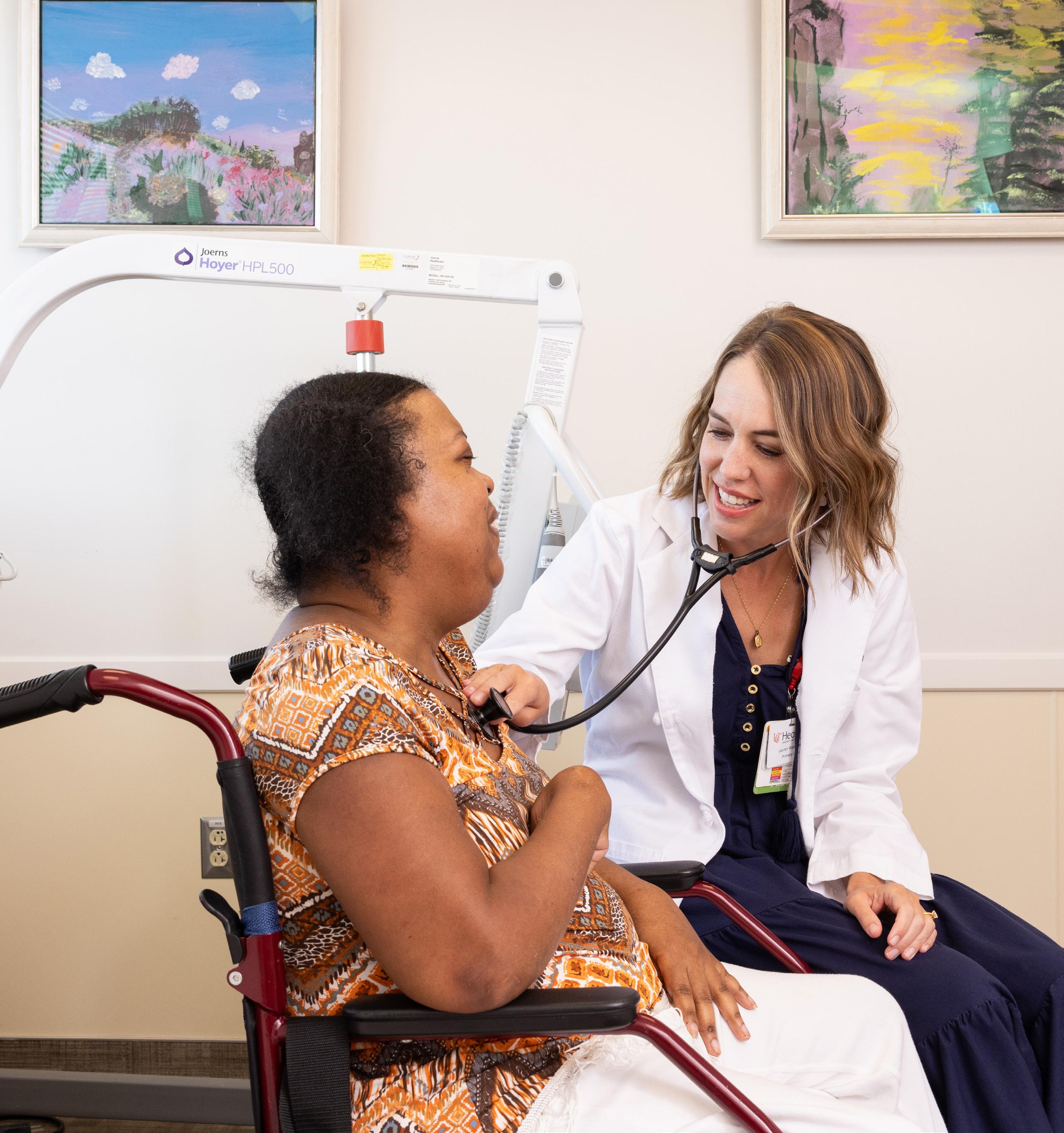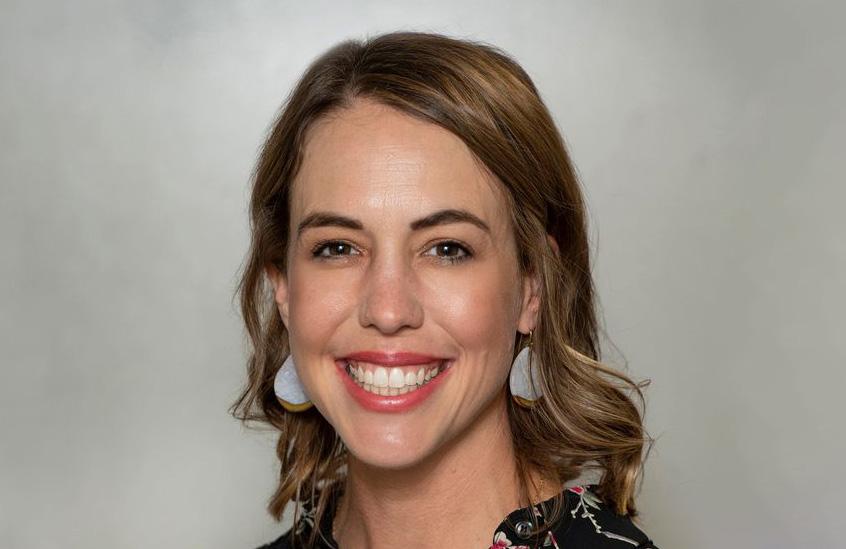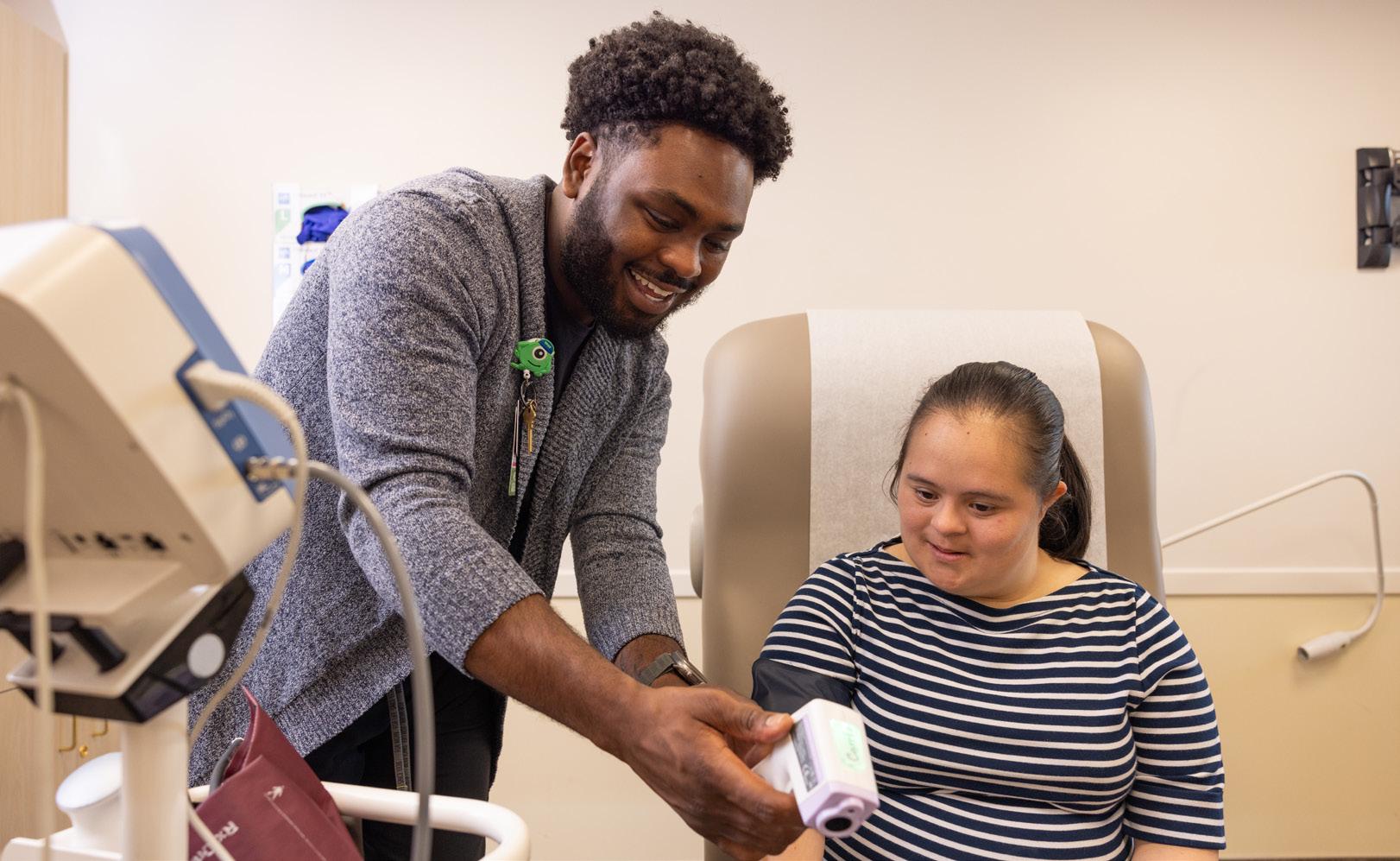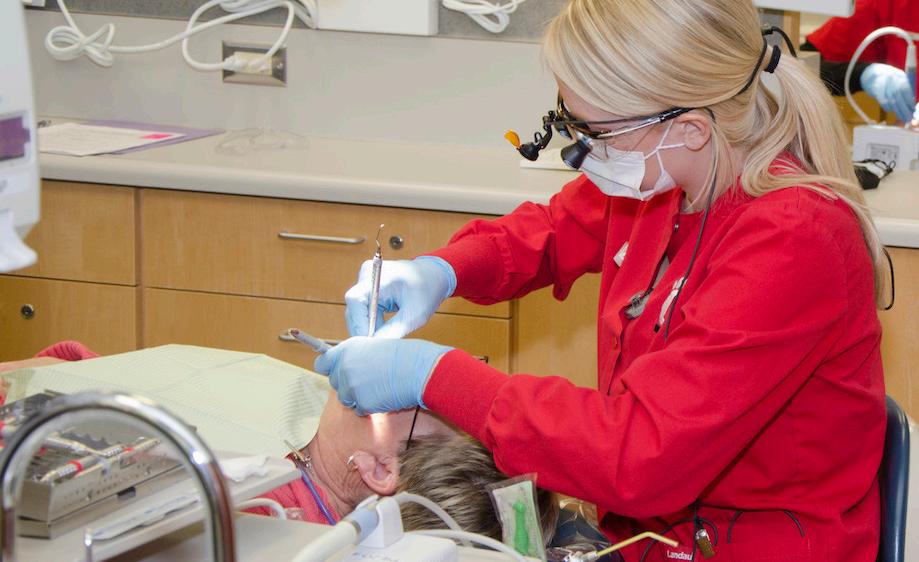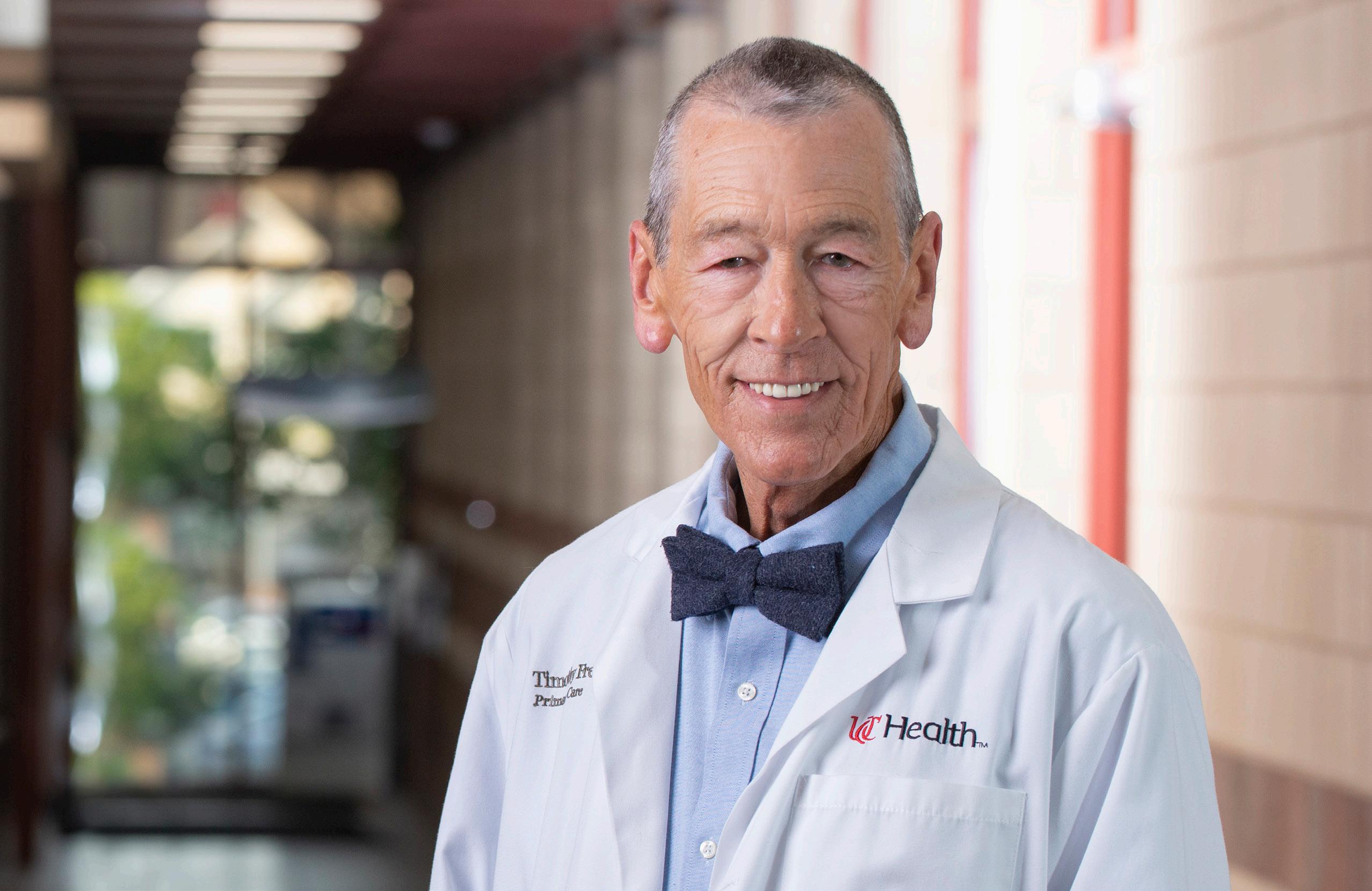TIMOTHY FREEMAN, MD,
CENTER FOR DEVELOPMENTAL DISABILITIES
Advancing Care, Improving Lives
Friends of the Freeman Center,
Every day we are inspired by our patients and their families. Their experiences with the healthcare system ignited the fire to create the UC Health Timothy Freeman, MD, Center for Developmental Disabilities. Their experiences continue to fuel this fire to elevate the quality of patient care for adults with developmental disabilities. At the Freeman Center, we are committed to advancing healthcare for our community and beyond. But we cannot do it alone.
We are embarking on a bold journey to build a state-of-the-art health center dedicated to transforming care for our patients. This isn’t just about bricks and mortar—it’s about creating a physically accessible space where individuals with developmental disabilities are embraced by the broader adult health system. It’s a place where patients and families find expert care for their loved ones with providers they trust, a place where future leaders in developmental medicine receive education and training and a place where care is first and foremost person-centered.
Philanthropy can unlock doors that have too long felt inaccessible to adults with developmental disabilities. It drives innovation, supports integrative therapies and ensures we can meet the needs of each individual, no matter how complex their care. With your partnership, we can provide the world-class services that every person deserves, from cutting-edge clinical care to holistic support that addresses the emotional and social needs of our patients and their families.
We ask you to stand with us. Whether as a philanthropist, community leader or family member, your support is critical to ensure we continue to grow and evolve our services. Every gift has the power to transform lives, and together we can shape a brighter tomorrow for those who need it most.
Thank you for being part of this important movement. With your help, we can break down barriers and impact the future of healthcare for adults with developmental disabilities.
With gratitude,
Lauren Wang, MD Center Director, Freeman Center
Mission
To advance healthcare for adults with developmental disabilities by providing person-centered, coordinated and interdisciplinary care, educating health professionals and partnering with the community.
Vision
Healthcare equity and access for adults with developmental disabilities.
POWERED BY PHILANTHROPY
The Timothy Freeman, MD, Center for Development Disabilities provides care for individuals 18 and older. It is one of our region’s best healthcare resources for adults with developmental disabilities. Poised to become a national leader, the center strives to serve as an example for other academic health systems throughout the country looking to advance care for this population in their own communities.
The Freeman Center’s unique care model combines primary and behavioral healthcare in one setting along with other co-located services. There are over 1,300 patients who receive care at the center and there is a growing waitlist for services.
To meet this increasing demand, the Freeman Center needs to grow. It needs to expand not only its physical space, but grow its number of clinicians, its research capabilities and its ability to train and educate the next generation of providers to care for adults with developmental disabilities.
To do so, we look to the support of our engaged partners, community stakeholders and our grateful patient community.
Since the center was dedicated in honor of beloved physician Timothy Freeman, MD, generous individuals and foundations have contributed more than $3 million, including support from National Down Syndrome Society, the G. Richard & Jane S. Thomas Foundation, the Hatton Foundation, the Manuel D. & Rhoda Mayerson Foundation and the Ronald and Florence Koetters Foundation, with an additional $250,000 invested through planned giving. These gifts support current clinical operations, innovative programs and center development.
GROWTH TO BETTER SUPPORT OUR COMMUNITY
A gift to the Freeman Center campaign will help support the following positions and lead to sustainability of programming and clinical services for the next five years.
Program Director: As an essential support for the Freeman Center director, the program director will assist in the center’s development, including strategic partnerships and growth of capital and programmatic projects. The program director also oversees the Freeman Center’s relationship with the UC Foundation, UC Marketing and other internal partners.
Developmental Medicine Fellowship Director: The Freeman Center is creating one of the first developmental medicine fellowships in the country dedicated to training physicians to provide primary care to adults with developmental disabilities. The fellowship director recruits, trains and mentors fellows of a one-year Freeman Center physician fellowship. A fellow will be able to provide primary care to approximately 400 patients at the Freeman Center per year.
Community Navigator: The community navigator works closely with patients and families to bridge the gap between healthcare and community-based supports. They serve as a liaison between the Freeman Center and various community organizations serving adults with developmental disabilities including Cincinnati Children’s Hospital Medical Center and Hamilton County Developmental Disabilities Services. Available to all patients at the Freeman Center, the community navigator assists with transportation, housing, employment and other necessities by partnering with community organizations.
Behavior Supports: Behavior support specialists will provide direct support in clinic and throughout the broader health system to make patient visits safe, comfortable and less anxiety-provoking or traumatic. Similar to child life specialists in pediatrics, these specialists will assist patients to decrease anxiety related to imaging, blood draws, blood pressure checks and other stress-inducing situations common in a clinical environment. They will also provide education, training and resources to staff throughout UC Health, including inpatient, emergency room and surgical settings.
Research Director: A research director will explore and pursue funded research opportunities that will benefit our patients and families. The Freeman Center is committed to growing our research program. To pursue funded research opportunities and partner with other national leaders in the field, a director needs dedicated, protected time outside of clinical activities.
A FOUNDATION FOR THE FUTURE
To offer best-in-class care, it is imperative to recruit and retain talented clinical leaders, participate in pioneering research and provide educational opportunities to staff and trainees. Endowments for center directorships, a clinical research program and education ensure that the Freeman Center will live into the future, providing service to our community for years to come.
Philanthropic endowment options include:
Center Director: $1.5 million. Leading the Freeman Center interdisciplinary team, developing innovative programming, strategic planning, fostering community partnerships and administrative responsibilities are just a few of the many roles required to advance the Freeman Center. Philanthropic support can ensure a center director has dedicated time and resources to growing the center successfully.
Behavioral Health Director: $1.25 million. This individual will develop and lead the Freeman Center’s behavioral health services, offering both programmatic and operational leadership. The behavioral health team at the Freeman Center is comprised of psychiatry, psychology, social work, therapy and behavior supports. The behavioral health director needs protected administrative time beyond clinical activities to develop and launch a robust, innovative behavioral health program that will be implemented throughout the UC Health system.
Clinical Research Program: $3.65 million. Creating a research endowment will allow for innovative research opportunities at the Freeman Center that have the potential to significantly improve the lives of our patients and their families in Cincinnati and beyond. An endowed research program will allow the Freeman Center to create a research infrastructure and fund a clinician’s research effort while working toward substantial grant funding.
Education: $2.25 million. Funding for education is required to not only train medical students, residents and other trainees, but also provide professional development to interdisciplinary team members, including physicians, advanced practice providers, dietitians, dentists, psychologists and therapists. Education and training are critical to provide best-in-class care to our community and become leading experts within the developmental medicine field.
GROWTH THROUGH PARTNERSHIPS
Partnerships bring more support to patients and their families, giving them additional service options and access within the Freeman Center. The center has the ability to transform care through expanded services and programs in every step of their healthcare journey.
These partnerships include:
Dental
Oral care is often cited as the number one unmet healthcare need for people with disabilities. The “why” is a complex mix of stigma, misconceptions, a lack of training, poor reimbursement models and a need for expanded dental benefits. As a result, many people with disabilities face long wait times, sometimes spanning years, for a dental appointment. Many others require sedation for dental exams, adding another barrier to receiving care.
The consequences are enormous. A lack of available, affordable coverage for our most vulnerable population means that their rates of dental disease are much higher than the general population. According to an Indiana University Center for Health Equity survey, half of those with disabilities were experiencing active dental issues, such as pain or bleeding gums. Two-thirds had lost teeth due to untreated dental issues.
The Freeman Center, in partnership with UC Health’s Dental Center, understands and seeks to challenge these disparities. Our vision is to deliver on the promise of better oral and overall health for people with developmental disabilities.
Legal
The Freeman Center and the Legal Access Clinic (TLAC) at the University of Cincinnati College of Law are coming together to start an innovative medical-legal partnership to identify and address unmet legal needs frequently faced by adults with developmental disabilities. Through this partnership we hope to help patients and families navigate legal concerns that are frequently brought up during medical visits and overcome barriers to accessing legal services. In addition to providing direct legal and medical service, TLAC and the Freeman Center also share an educational mission: educating the next generation of public interest lawyers, and the next generation of leaders in developmental medicine. Through this partnership we hope to help patients and families navigate legal concerns that are frequently brought up during medical visits and overcome barriers to accessing legal services.
Integrative medicine
Another unique partnership for the Freeman Center is with the UC Osher Center for Integrative Health. This interdisciplinary collaboration will provide center patients and their caregivers access to integrative and lifestyle medicine programming, including tai chi, yoga, mindfulness-based stress reduction and expressive therapies like music and art therapy. Enhanced clinical offerings such as acupuncture, massage therapy and lifestyle medicine consultations can also be available.
For patients, these therapies improve physical health by enhancing mobility and reducing pain while promoting mental and emotional well-being through stress reduction and emotional expression. They also foster vital social interaction, helping patients feel more connected. For caregivers, these programs offer stress management tools, build emotional resilience and reduce burnout, ultimately contributing to the overall well-being of both patients and caregivers.
PRIMARY CARE OFF STAGE/SUPPORT PAUSE/SENSORY BEHAVIORAL HEALTH COMMUNITY
Illustration of new Victory Parkway location created by MSP Design and subject to change.
CIRCULATION/UTILITY
FLOOR PLAN AREA BREAKDOWN
STRUCTURAL GROWTH
In 2025, we will grow our services with a new and expanded 15,000 square-foot location at UC Health’s Victory Parkway campus.
Our new location will more than double the number of larger, more accessible exam rooms and the overall space is designed to meet the unique physical and sensory needs of our patients. The efficient layout will allow for seamless collaboration for our primary care, behavioral health and other interdisciplinary team members. Lab testing will be available onsite with behavior support to reduce anxiety and take the burden off patients and their families. Other features of our new space include a sensory room, dedicated learning spaces with observation rooms to accommodate trainees and a community room to be used for group visits and education.
In addition to the Victory Parkway building, naming opportunities exist throughout the facility:
• Exam rooms
• Sensory room
• Community/Group therapy room
• Staff break room
• Pause spaces
• Teamwork spaces
• Education spaces
• Consultation rooms
TIMOTHY FREEMAN, MD
For more than 30 years, Tim Freeman, MD, focused his medical practice on the care of adults with developmental disabilities. He was a pioneer in this field, long before there was national recognition of the need for improved care for this community. He taught, mentored and inspired hundreds of physicians during his career.
We are honored to continue his legacy through our work at the Freeman Center.
THANK YOU
We are grateful for your thoughtful consideration of a leadership gift to support the Freeman Center. Our growth and expansion will position us as a national leader in developmental medicine and interdisciplinary care models, transforming healthcare for adults with developmental disabilities in our community and beyond.
CONTACT
Emma Laverty
Associate Vice President of Development, UCGNI Emma.Laverty@foundation.uc.edu 610-331-9046
Ben Jager
Associate Director of Development, UCGNI Ben.Jager@foundation.uc.edu 859-992-1136
Kaylee Balzano
Assistant Director of Development, Clinical Programs Kaylee.Balzano@foundation.uc.edu 513-558-2384
